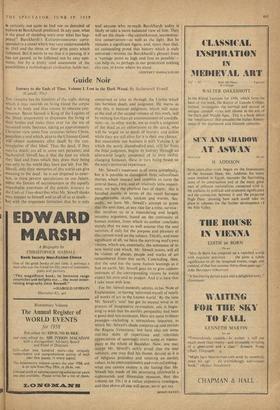Guide Noir
Journey to the Ends of Time. Volume I. Lost in the Dark Wood. By Sacheverell Sitwell. (Cassell, 35s.)
vampire has the freedom of the night, during which it may nourish on living blood the corpse that is its body and thus ensure its obscene con- tinuance. Baron Samedi is King of the Legions of the Dead, empowered to dispossess the living of their bodies and make them over for the use of favoured souls. Socrates, taking an approximately Christian view some font' centuries before Christ, postulates a soul which, akin to the Ultimate Good, , will obtain sustenance after death by the con- lemplation of that Ideal. Thus the dead, if they \ \ e death, are all in some sort parasites; and Sacheverell Sitwell has it that the host on which they feed and from which they draw their being can only be the world they have just left. For Mr. Sitwell, only their memories of this world can give meaning to the dead : he is not disposed to enter- tain, in these present speculations on our future, either the fancies of necromancers or the equally improbable assertions of the priests. Journey to the Ends of Time describes what Mr. Sitwell thinks may happen to himself and to all of us at death— but with the important limitation that he is only concerned to take us through. the Limbo which lies between death and judgment. He warns us that this is because judgment, which will occur at the end of the second volume of this work, will be nothing less than an announcement of annihila- tion—or, in other words, not so much a judgment of the dead as an exhortation to the quick, who will be 'urged on to deeds of bravery and action while they are still alive for it is their one chance.' But meanwhile our business is with Volume 1, in which the newly disembodied soul, still far from the final judgment, begins its journey through an afterworld largely composed of its own swiftly changing fantasies, these in turn being based on the soul's terrestrial experience.
Mr. Sitwell's treatment is of some complexity: but it is possible to distinguish three subordinate themes which interact and coMbine to form the central thesis. First, and of relatively little import- ance, we have the physical fact of death : this is handled mainly in terms of the usual baroque paraphernalia, skulls, sockets and worms. Sec- ondly, we have Mr. Sitwell's attempt to prove that the soul does, at any rate for a time, survive : this involves us in a meandering and largely intuitive argument, based on the continuity of human instinct. from which its author concludes merely that we may as well assume that the soul survives. if only for the purpose and pleasure of this current work on the subject. Thirdly, and most significant of all, we have the surviving soul's own visions, which are, essentially, the substance of its new world and which, Mr. Sitwell insists, will all be visions of places, people and works of art remembered from this earth. Concluding, then, that the soul has the same human leanings as it had on earth. Mr. Sitwell goes on to give copious instances of the corresponding visions he would expect his own soul to project. And it is here that I take issue with him.
For Mr. Sitwell modestly admits, in his 'Note of Explanation.' to having 'informed myself of nearly all works of art in the known world.' By the time Mr. Sitwell's 'soul' has got its second one in its process of imaginative re-creation, one is begin- ning to wish that his earthly personality had been a good deal less assiduous. Here are some brilliant passages--including a miraculous sequence in which Mr..Sitwelfs shade conjures up and revisits the Regata Veneziana: but here also are some cod-like slabs of repetitious and relentless appreciation of seemingly every scene or master- piece in the whole of Baedeker. Now, one may accept Mr. Sitwell's sickly proof that the soul survives: one may find his theme, devoid as it is of religious prejudice and insisting on earthly values, to be unexceptionable and even refreshing: what one cannot endure is the feeling that Mr. Sitwell has made of his promising afterworld a nightmarish and illimitable museum. that this volume (at 35s.) is a rather expensive catalogue. and that above all one will never, never get out,
SIMON RAVEN






































 Previous page
Previous page